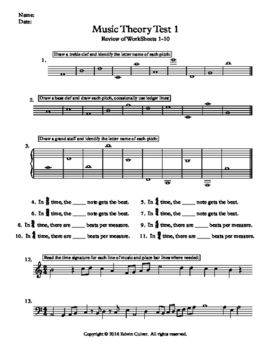
You can also view the research and results of the program on the website. For the teachers and parents trying to help children succeed, that time could also improve math and academic skills.Ĭontact us today to schedule an assessment. Compare two pitches played on different instruments. Taking time to appreciate music is a reward on its own. Test your knowledge of music notation markings for tempo, expression and dynamics. Fine motor skills are also improved by playing musical instruments. It takes a considerable amount of patience to practice scales, and children who apply similar patience to doing schoolwork will have an advantage over those who don't. Students who commit themselves to learning an instrument may also learn other skills that help them perform better in school. In this section: Online test Material Emotional Clips Montreal Battery of Evaluation of Amusia (MBEA) The Montreal Battery of Evaluation of Musical. Studies even show that children who play instruments are able to complete complex mathematical problems better than peers who do not play instruments. Performing music, therefore, reinforces parts of the brain used when doing math. It's about time signatures, beats per minute and formulaic progressions. Melody and accent requires the participant to process, and retain rhythmic and melodic patterns, which is hypothesised to be closely linked to the encoding and decoding of grammatical syntax. Learning music improves math skills because, at some level, all music is math. The musicality test encompasses 4 sub-categories: tuning, melody, accent and tempo. While listening to enjoyable music may improve cognition and math skills, performing music offers more advantages. Performing Music Teaches Valuable Lessons to Students Robert Melillo has worked with a composer to develop a line of music that specifically addresses strengthening each hemisphere. More recent studies show that the Mozart Effect, as it is known, has very little to do with listening to Mozart and more to do with listening to music that activates a certain portion of the brain. Classical music and minor tones for the right side, upbeat and major tones for the left side. Listening to Music May Improve Math Skills and CognitionĪ considerable amount of research suggests that listening to music may improve cognitive skills. As such, listening to music could improve a student's cognition and ability to learn math skills. As recently as 2012, one study showed that listening to music during a math test could improve performance by 40 percent. As such, listening to music could improve a student's cognition and ability to learn math skills. Based on extensive research and knowledge that certain types and frequencies of sound are processed by the two hemispheres of the brain differently, using specific music and sounds may help to stimulate one hemisphere more than the other and possibly create more balance in the brain. Some research finds that music activates the same areas of the brain that subjects use while solving spatial-temporal reasoning problems.
#Musicality test how to#
Exactly how much students benefit may depend on the type of music they listen to and whether they choose to learn how to play instruments. Test Specialists work in tandem to log every mile driven by Argo’s fleet, go on data-collecting missions to build 3D maps of the streets, and provide essential feedback about system performance to the engineers who develop the Argo self-driving system (SDS). By concentrating on the problem at hand (left brain) while playing the piano or violin (right brain), he was able to strengthen the communication between the two hemispheres of his brain and increase brainpower. In fact, Einstein used to sit and play music when he was stuck on a mathematical problem. Total marks in all individual Practical graded exams are 150.There are studies show a correlation on how it might benefit students struggling to keep up with their peers.

Listening skills and musical perception through aural tests.


Notation skills through a sight-reading test.Technical skills through scales and arpeggios.Performance skills through pieces or songs.To succeed in our Practical exams, candidates need a combination of skills and understanding. There are no age restrictions and students can start with any grade or skip grades if they want to.

For this reason, we don't restrict examiners to assessing only their own instrument but require them to examine all instruments. Examiners assess the quality of the music-making, not how it's achieved.
#Musicality test professional#


 0 kommentar(er)
0 kommentar(er)
